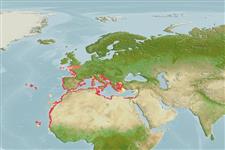Preferred temperature (Ref.
115969): 13.3 - 20.7, mean 17.3 (based on 39 cells).
Phylogenetic diversity index (Ref.
82804): PD
50 = 0.7656 [Uniqueness, from 0.5 = low to 2.0 = high].
Bayesian length-weight: a=0.00676 (0.00429 - 0.01066), b=3.06 (2.92 - 3.20), in cm Total Length, based on LWR estimates for this species & (Sub)family-body (Ref.
93245).
ระดับชั้นอาหาร (Ref.
69278): 3.9 ±0.65 se; based on food items.
ความสามารถในการกลับคืนสู่ปกติ (Ref.
120179): ขนาดกลาง, เวลาต่ำสุดที่จะทำให้ประชากรเพิ่มขึ้นเป็น 2 เท่าใช้เวลา 1.4 - 4.4 ปี (K=0.07-0.16).
Prior r = 0.25, 95% CL = 0.16 - 0.37, Based on 1 full stock assessment.
Fishing Vulnerability (Ref.
59153): High vulnerability (55 of 100).
Climate Vulnerability (Ref.
125649): High to very high vulnerability (74 of 100).
